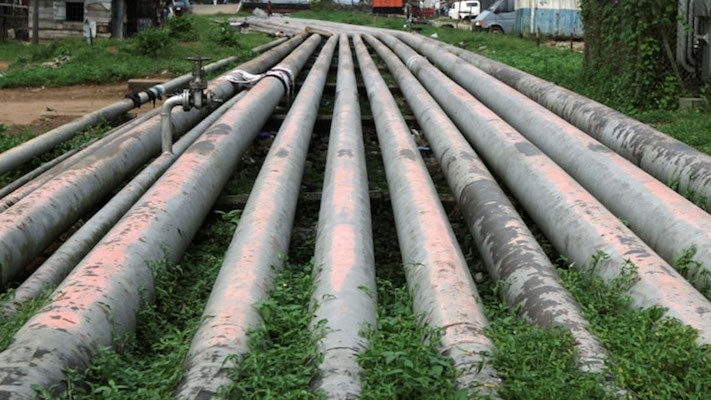The Nigerian National Petroleum Company Limited (NNPC Ltd) has again announced a new date for the completion of Nigeria’s $2.8billion Ajaokuta–Kaduna–Kano gas pipeline project being constructed by Oilserve Limited.
The construction of the AKK pipeline commenced in July 2020 and the project is aimed to ease transportion of natural gas from Ajaokuta in Kogi state to Kano through several states.
Read also:FG approves $2.5bn funding for AKK pipeline as Oilserv completes 10% construction
Oritsemiyiwa Eyesan, executive vice president, Upstream, NNPC in November 2023 had said that the project will be ready for commissioning in December 2023.
However, Mele Kyari, the Group Chief Executive Officer (GCEO) of the Nigerian National Petroleum Company Limited (NNPC Ltd) on Thursday said that the completion date for the project is now December 2024.
Kyari disclosed this while delivering his address at the 2024 Society of Petroleum Engineers (SPE) Oloibiri Lecture Series & Energy Forum (OLEF) in Abuja on Thursday.
Read also:‘AKK pipeline will commercialize upstream gas, spur industrialization’
Kyari explained that efforts were ongoing at the NNPC Ltd to develop the right infrastructure needed to bridge the energy access gap in Nigeria, while drivinv prosperity for Nigerians.
“We are committed to developing gas infrastructure across the country. We are dedicated to investing in critical infrastructure to enhance economic prosperity by supplying gas to the domestic market, targeting at least 8 billion cubic meters,” he said.
According to Kyari, the company is on course to ensure that the AKK pipeline is ready to start receiving gas by the end of this year. He added that work was ongoing to repair its pipelines so to limit the use of tankers in delivering petroleum products.
Kyari, calling for support in leveraging Nigeria’s abundant gas resources for economic prosperity, said that on the global front, NNPC Ltd was working on expanding gas supply to the international market primarily through the NLNG Train 7 project while efforts were also being made to kick off Train 8 as well as the various floating LNG initiatives.
Read also:AKK Pipeline sets stage for Nigeria’s economic stability
In his remarks, Salahuddeen Tahir, Chairman of the Society of Petroleum Engineers (SPE) Nigeria Council, stressed on the importance of technology in improving infrastructure, transportation, and security efforts in the energy sector, adding that ensuring stability in the energy sector would drive economic growth, national security, and environmental sustainability.
Tahir who doubles as Head of Asset and Investments Management (NGPIS), said there was need to develop a diversified and sustainable energy transportation system as a measure for mitigating climate change and enhancing energy security.
He emphasized the critical role of energy in modern society saying, “It’s a trigger for essential services such as transportation, heating, electricity generation, medical services, security, banking services, and communication.
He said, “Integrated strategies that address infrastructure, transportation, and security are essential for achieving national stability. While progress has been made in expanding energy infrastructure and enhancing production capacities, significant challenges persist, particularly in areas such as transportation and security.
“The theft and vandalism of pipelines, coupled with inadequate infrastructure, continue to impede the efficient transportation of energy resources, undermining the sector’s
stability. Technology, undoubtedly, will play a pivotal role in improving infrastructure, transportation, and security within Nigeria’s energy sector.
“Through the strategic deployment of IoT sensors, data analytics, and digital platforms, operations can by far be optimized, security enhanced, and sustainability promoted. Moreover, fostering public-private partnerships and investing in workforce training will be crucial in ensuring the effective implementation of these technological solutions.”
Also speaking, Heineken Lokpobiri, the minister of petroleum (oil) said that the government is ensuring an enabling environment to diversify the economy, particularly ramping up oil and gas investments for better revenue generation and economic stability.
He stressed tbat the integrated strategies for infrastructure development should take advantage of the abundant fossil fuel to save against the future, while considering transitioning into other renewable energy sources, such as solar and wind, to diversify our energy mix.
He said, “Smart grid technologies and digitalization should be incorporated to enhance efficiency, reliability, and resilience in energy delivery.
“Government will take path way geared towards addressing the infrastructural bottlenecks to enhance economic growth and efficient supply of energy resources to the nation.
“Most significantly is the President’s commitment to strengthen the investment environment in line with the Petroleum Industry Act (PIA) to attract both international and domestic investors, thereby making Nigeria the preferred energy destination.”
He also noted that transportation plays a critical role in ensuring the smooth flow of energy resources across the country, adding that Nigeria’s vast territory necessitates an efficient transportation network to facilitate the movement of crude oil, natural gas, and other energy commodities.
“Nigeria has the potential to transition towards a more sustainable energy future by improving on the key areas of infrastructure, transportation and security while also embracing research and innovations towards renewable energy and fostering collaboration between various stakeholders,” he added.

